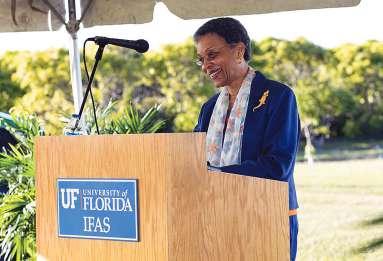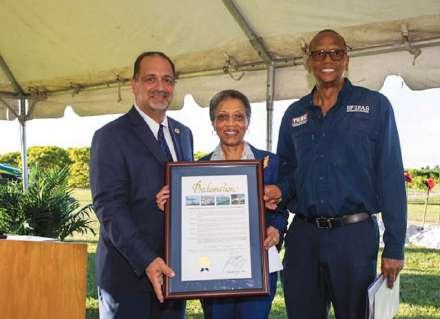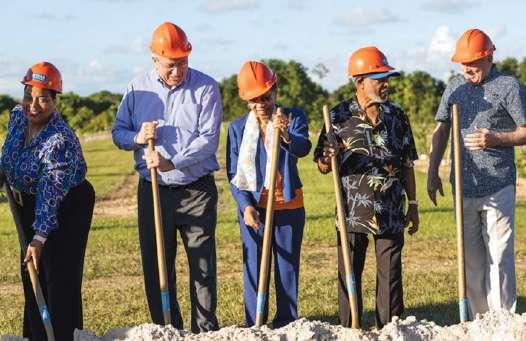
8 minute read
Features
FEATURE
From A Fruit Fly To Entomology - Dr. Pauline O. Lawrence
Advertisement
BY DAWN A. DAVIS
Aah, for the love of mangos … a nice big yellow one filled with juice that drips down your chin when you bite into it! Well, you might not be the only one enjoying it. The worm inside it, some of which you may have eaten, is also living and thriving on its nutrients.
This worm, or maggot, comes from the fruit fly. This is where Pauline O. Lawrence’s curiosity and career in entomology had its genesis.

Tomatoes And Brown Sugar
Born and raised in Jamaica, her curiosity bubbled up as a child growing up in her parents’ large garden in Buff Bay, Portland.
“I used to eat the tomatoes while they were still on the vine. I would bite off the little nipple that would ripen first and eat it with brown sugar. My father would ask, ‘what’s happening to the tomatoes, something is eating them,’” the now Professor Pauline O. Lawrence revealed in a recent conversation with Caribbean Today.
“And I said to him, ‘Papa, it must be some insects.’ But one day he caught me nibbling at one and he said, ‘So this is the insect eating my tomatoes.’ So, my punishment was to get a jar and collect all of the insects I could find,” Dr. Lawrence reminisced with a laugh.
With her link to agriculture, and her Girls Guide training, Lawrence had no problems completing her task which only served to heighten her interest in the sciences and the natural environment. She would go on to UWI Mona where she earned a BSc (Honors) in Zoology from the Faculty of Natural Sciences, which is now called the Faculty of Science and Technology.
“After I graduated from the University of the West Indies, (UWI), I went to work at the Ministry of Agriculture,” Dr. Lawrence disclosed. “Our job was to travel around the island and look at the distribution of infected fruits, how many crops were affected … We worked to find a way of controlling the insects because pesticides could not do it. So, I got interested in biological control.”
Her natural instinct and aptitude would lead her to the University of Florida (UF) in 1969 where she began graduate work at the main campus in Gainesville before moving on to Homestead. Lawrence was the first Black female student in entomology and the first female student to live and study on the UF/IFAS TREC campus.
Asked how she was received in the racially divided southern United States at that time, Lawrence noted: “When I came, I really was not too familiar with the strict racial divide. I had a wonderful mentor, Dr. Samuel Apeji, a Nigerian in the Ministry of Agriculture, Jamaica who was very influential in my coming to Florida. He said to me, ‘don’t leave the campus.’” Lawrence pointed out that she did not have any problems, but it was very clear that the
only Blacks around her at the university were janitors and maids. She was the only black female student in entomology.
Lawrence added that Caucasians on campus were very polite and extremely impressed with her sophisticated level of English. But it was her focus, confidence, and love of the natural sciences that helped carve out a career in academia.
Parasitic Wasp
Under the guidance of her major professor, Dr. Baranowski at the UF Tropical Research and Education Center, (TREC) in Homestead, Lawrence dug deeper into the study of fruit flies, looking at ways of controlling them with biological control agents. This agent turned out to be a parasitic wasp that carries a special virus inside its body to destroy the fly’s immune system and prevent the fly from killing the growing baby wasp.
Lawrence explained: “It’s a tiny wasp, like an ant. There is a little structure coming from the end of it like a tail. It’s an egg depositor, we call it an ovipositor. It lays its eggs inside the body of the worm, the fruit fly larvae.”
“The Wasp’s specialty is to find the larvae inside the fruit,” she added. “So we were watching her as she touched the fruit with her antennae or feelers at the top of her head and located the larvae even though she couldn’t see it. She would push her ovipositor through the fruit like a fine needle, put it into the body of the larvae and lay her eggs. So, her babies would feed on the tissues of that maggot.
Dr. Pauline O. Lawrence addressing guests at
the groundbreaking. (Photos courtesy of Pauline Lawrence/ ufl.edu)
Instead of a fly coming out when the fruit falls to the ground you have a little wasp coming out. And those wasps would go and find more flies. So that’s how biological control works.”
In that process, Lawrence discovered this brand-new virus inside the body of the wasp and how it works to kill fruit flies. Her discovery helped to explain how this wasp which is being used all over the world is so successful at controlling fruit flies.
Giving Back
Lawrence earned her doctorate from UF in 1975, started as Assistant Professor in 1976 earning full professorship in 1989. She is currently Professor Emerita in Physiology and Biochemistry in the Department of Entomology and Nematology at the University of Florida after fulfilling her dream of studying the fruit fly and making major contributions to the field.
As student, faculty, and donor, Lawrence has given back to the university in many ways. And now, demonstrating its gratitude, The University of Florida in Homestead is honoring Dr. Lawrence with a new dormitory building being named after her at the UF/IFAS Tropical Research and Education Center, (TREC). The Pauline O. Lawrence Student Residence will be the first UF building named after a Black person.
“I am grateful that the Board of Governors and Dr. W. Kent Fuchs, the university president saw merit in doing this when Dr. Scott Angle, Senior Vice President for the Institute of Food and Agricultural Sciences (IFAS) and Dr. Edward “Gilly” Evans, Director, Tropical Research and Education Center (TREC) in Homestead presented the case. All were exceedingly supportive,” she told CT, tears in her eyes. “I am humbled when I think of the slaves who bled and died, adding their tears, work, and sweat in this soil.”
“But I am also hopeful,” Dr. Lawrence added. “Because at the groundbreaking I saw many young people from all over the world, especially the young women, who said my work helped to reinforce their drive.”
“I hope it reminds all the future graduate students coming through the center that entomology and other scientific disciplines are open to everyone, regardless of background,” Lawrence added.
“The dorms are part of a larger vision for TREC in which graduate students are an integral part of the research and teaching community at the center,” said Edward ‘Gilly’ Evans, the center’s director in a UF blog. “Graduate students are an essential part of what we do at research and education centers. At TREC, they play a critical role in our research supporting agriculture and natural resources in South Florida, all while receiving mentorship and professional development from our faculty.”
“Naming memorializes the contributions of faculty, students, donors - and Dr. Lawrence is all three - who have helped build the foundation for excellence at UF,” J. Scott Angle, UF’s senior vice president for agriculture and natural resources and leader of UF/IFAS added on ufl.edu. “This moment in our university’s history reminds us that we strive for preeminence by making our institution more inclusive, diverse, equitable and accessible for all people. Dr. Lawrence’s career is an inspiration for us to
undertake this important work.” It is because of this and the many who helped propel her that Dr. Lawrence is also giving back to the land of her birth. She and her husband, Dr. Carlton G. Davis, have established scholarships for deserving students in entomology at UF and in the life sciences and biotechnology at the University of the West Indies, Mona. They also offer scholarships to students at Hampton high school in Malvern, St. Elizabeth. And this Christmas, she and her husband will celebrate the season just as she and her family did in Jamaica, being thankful for the opportunities and celebrating those who will follow. “We are going to have a Caribbean Christmas,” Dr. Lawrence shared with Caribbean Today. “I’m going to decorate the house, have a few friends over. I usually sit at the piano and play some old hymns and L to R: Mr. Jorge Abreu, Director of Agriculture, presenting the Christmas songs, which we used Proclamation on behalf of Commissioner Kionne McGhee of Miami-Dade County (Dist.9), Florida to Dr. Pauline O. Lawrence, c.; and Dr. Edward “Gilly” Evans, Director of UF/IFAS/TREC, to do when my parents were alive.”
Homestead. The Proclamation declared November 5, 2022
“Dr. Pauline O. Lawrence Day.” (Photos courtesy of Pauline Lawrence/ ufl.edu)
L-R: Dr. Marsha McGriff, UF Chief Diversity Officer and Senior Advisor to the President; Dr. W. Kent Fuchs, UF President; Dr. Pauline O. Lawrence; Dr. Carlton G. Davis, Distinguished Professor (Ret); and Dr. J. Scott Angle,
Senior Vice President for UF/IFAS. (Photos courtesy of Pauline Lawrence/ ufl.edu)

Y
9020 SW 152nd Street Miami, FL 33157 Tel: (305) 238-2868 (305) 253-6029 Fax: (305) 252-7843 Toll-Free Fax: 1-866-290-4550 1-800-605-7516 www.caribbeantoday.com Send ads to: sales@caribbeantoday.com
Vol. 34, Number 1 • DEC. 2022
PETER A WEBLEY Publisher
FELICIA J. PERSAUD Editor
BRANDON WEBLEY Web Copy Editor
LORNA ASENCOR Accounting Manager
HYACINTH LEIBA Account Executive
SABRINA G. ALEXANDER Graphic Design
Opinions expressed by editors and writers are not necessarily those of the publisher. Caribbean Today, an independent news magazine, is published every month by Caribbean Publishing & Services, Inc. Caribbean Today is not responsible for unsolicited manuscripts or photos. To guarantee return, please include a self-addressed stamped envelope. Articles appearing in Caribbean Today may not be reproduced without written permission of the editor.





